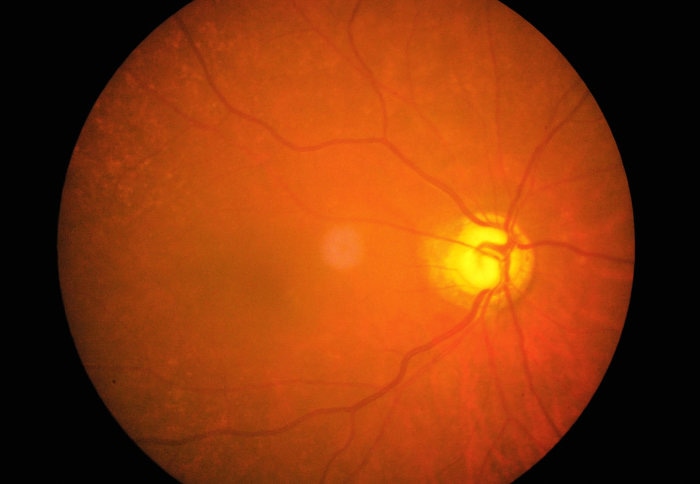Mar 25 2019
According to a group of students at Imperial College London, a new, revolutionary imaging tool can help prevent avoidable blindness.
 Retinal image of left eye in a 76 year old woman with glaucoma. (Image credit: Shutterstock /Santibhavank P)
Retinal image of left eye in a 76 year old woman with glaucoma. (Image credit: Shutterstock /Santibhavank P)
Established by Imperial medical students Uddhav Vaghela and Simon Rabinowicz, VUI Diagnostics won the Venture Catalyst Challenge (VCC) 2019 for the duo’s invention, which can considerably accelerate the diagnosis of diseases that cause loss of sight.
Operated by Imperial Enterprise Lab and powered by Blenheim Chalcot, the VCC is the biggest entrepreneurial competition for students in Imperial College London, challenging them to convert their concepts into innovative products, technologies, and businesses.
After competing against five other startups at the final on Thursday 21st March, 2019, and also the Audience Vote award, the group finally won the £30,000 top prize. The Audience Vote award will enable the team to meet with investors and spend time with Blenheim Chalcot partners.
During Enterprise Month 2019, the finals were conducted with a month full of exhibitions, showcases, and competitions, emphasizing the best of student innovation and entrepreneurship from across the Imperial College London.
This year’s VCC competition has been our biggest and best yet and is testament to the extraordinary reserves of entrepreneurial talent among Imperial’s diverse student community. At Enterprise Lab we passionately believe that entrepreneurship is more than just a one-off event and we’re now looking forward to working with all of the VCC teams over the coming weeks and months to help them push ahead and develop their ideas further.
Ben Mumby Croft, Director, Imperial Enterprise Lab.
Imperial plays a central role in addressing today’s global challenges, and our bright and energetic students are vital to this mission. Students need the freedom to pursue ideas, the mentorship to guide their explorations and the spaces to work on their development, and the funding to develop them into successful ventures. The Venture Catalyst Challenge offers just that.
Alice Gast, Professor and President, Imperial College London.
Innovative tool
Around 80% of global blindness can be prevented, according to the WHO. Retinal imaging can diagnose more than 50 eye and whole body diseases, including diabetes and glaucoma. However, existing tools are largely underused because they are expensive, inaccurate, and slow.
According to the VUI Diagnostics team, ophthalmoscopes, a medical device used for checking the inside of a patient’s eye, cannot be used easily and tend to have a narrow field of view, which means it is slow and does not easily provide a sufficient view of all the eye parts. The team claimed that a majority of clinicians do not have the required confidence to use the device.
Their solution is an accurate, simple, and low-cost plug-and-play retinal imaging tool that can be easily linked to a laptop or smartphone through Bluetooth. According to the team, the new tool is significantly faster when compared to ophthalmoscopy, and is capable of imaging 10 times more of the eye, enabling a relatively better precision.
The team further added that the novel instrument is so user-friendly that it can be used even by those who lack clinical training, and it is also significantly cheaper when compared to existing tools. According to the team, with 90% of the world’s blind living in the developing world, retinal imaging can be brought to the isolated regions that earlier lacked access to such a tool.
The VUI Diagnostics team is planning to initiate clinical trials later this year and will design their prototype with the help of Imperial College Advanced Hackspace.
The team stated that “We want to make avoidable blindness a thing of the past for everyone, everywhere.”